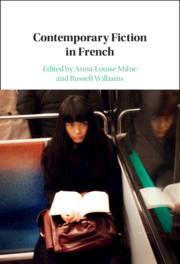Book contents
- Contemporary Fiction in French
- Contemporary Fiction in French
- Copyright page
- Contents
- Figures
- Notes on Contributors
- Introduction
- Chapter 1 Mediterranean Francophone Writing
- Chapter 2 After the Experiment
- Chapter 3 Getting a Future
- Chapter 4 Contemporary French Fiction and the World
- Chapter 5 The Franco-American Novel
- Chapter 6 Graphic Novel Revolution(s)
- Chapter 7 ‘Back in the USSR’
- Chapter 8 Fictions of Self
- Chapter 9 Trauma, Transmission, Repression
- Chapter 10 Wretched of the Sea
- Chapter 11 Urban Dystopias
- Chapter 12 Imagining Civil War in the Contemporary French Novel
- Notes
- Select Secondary Bibliography
- Index
Chapter 2 - After the Experiment
Published online by Cambridge University Press: 30 March 2021
- Contemporary Fiction in French
- Contemporary Fiction in French
- Copyright page
- Contents
- Figures
- Notes on Contributors
- Introduction
- Chapter 1 Mediterranean Francophone Writing
- Chapter 2 After the Experiment
- Chapter 3 Getting a Future
- Chapter 4 Contemporary French Fiction and the World
- Chapter 5 The Franco-American Novel
- Chapter 6 Graphic Novel Revolution(s)
- Chapter 7 ‘Back in the USSR’
- Chapter 8 Fictions of Self
- Chapter 9 Trauma, Transmission, Repression
- Chapter 10 Wretched of the Sea
- Chapter 11 Urban Dystopias
- Chapter 12 Imagining Civil War in the Contemporary French Novel
- Notes
- Select Secondary Bibliography
- Index
Summary
Three decades before Beigbeder, at the height of his nouveau roman experimentalism, Robbe-Grillet, published his own New York-set novel, Projet pour une révolution à New York (1970) / Project for a Revolution in New York, (1972), a metafictional phantasmagoria of noir clichés drawn from pulp American fiction, reassembled into a collage of circular plotting and interchangeable identities, in which the criminals are indistinguishable from the detectives, and police interrogations segue into hostile critiques of the novel’s own narrative. Any relation to the real city of its supposed setting is filtered through layers and layers of storytelling, that of the narrators and the author of the novel itself, and those of the myriad influences that gave rise to it. Beigbeider’s modest rejection of avant-gardism and espousal of earlier, more traditional forms of the novel is a common attitude among his generation of French writers. His fellow social commentator and literary provocateur, Michel Houellebecq, for instance, similarly distances himself from experimentalism, declaring himself saddened by ‘la débauche de techniques mise en œuvre par tel ou tel « formaliste-Minuit » pour un résultat final aussi mince’ / ‘the riot of techniques mobilized by some “Minuit formalist” or other for such a thin end result’. His own writing he views as a reconnection with older forms, as he told the Nouvel Observateur in an interview marking the publication of La Possibilité d’une île (2005) / The Possibility of an Island (2005): ‘Il faut croire que je m’inscris dans la tradition des écrivains français qui posent des questions au monde d’aujourd’hui et ne renient pas la narration balzacienne.’ / ‘You have to believe that I count myself in the tradition of French writers who ask questions of today’s world and do not spurn Balzacian storytelling.’ Does the current generation of French literary writers really choose Balzac over Robbe-Grillet, Sand over Sarraute, as its model? And if so, what has become of the postmodern play, the self-conscious critique, the Oulipian system, the theorist-novelist, the writing about writing that so characterized the post-War generation?
- Type
- Chapter
- Information
- Contemporary Fiction in French , pp. 34 - 52Publisher: Cambridge University PressPrint publication year: 2021

